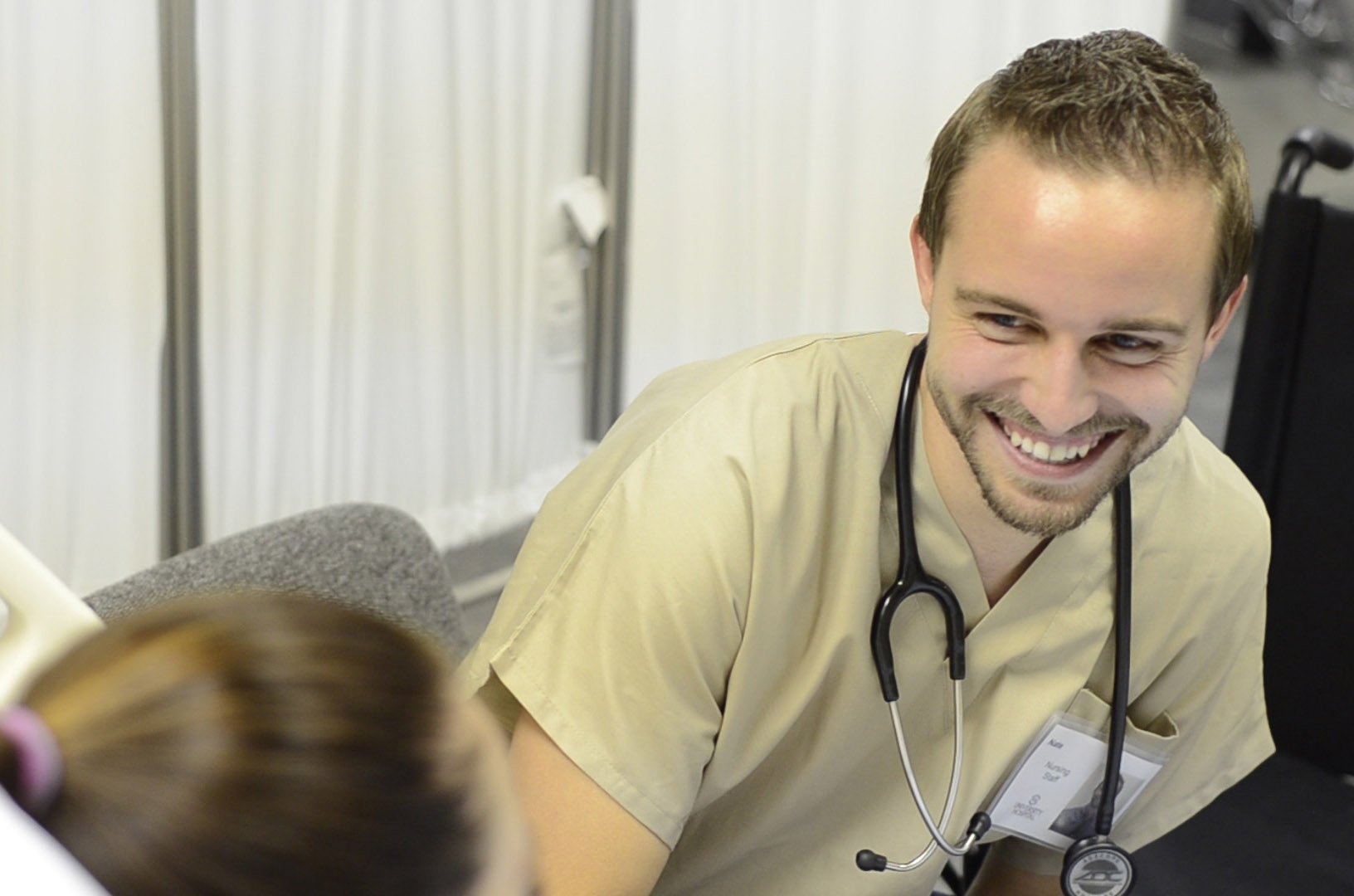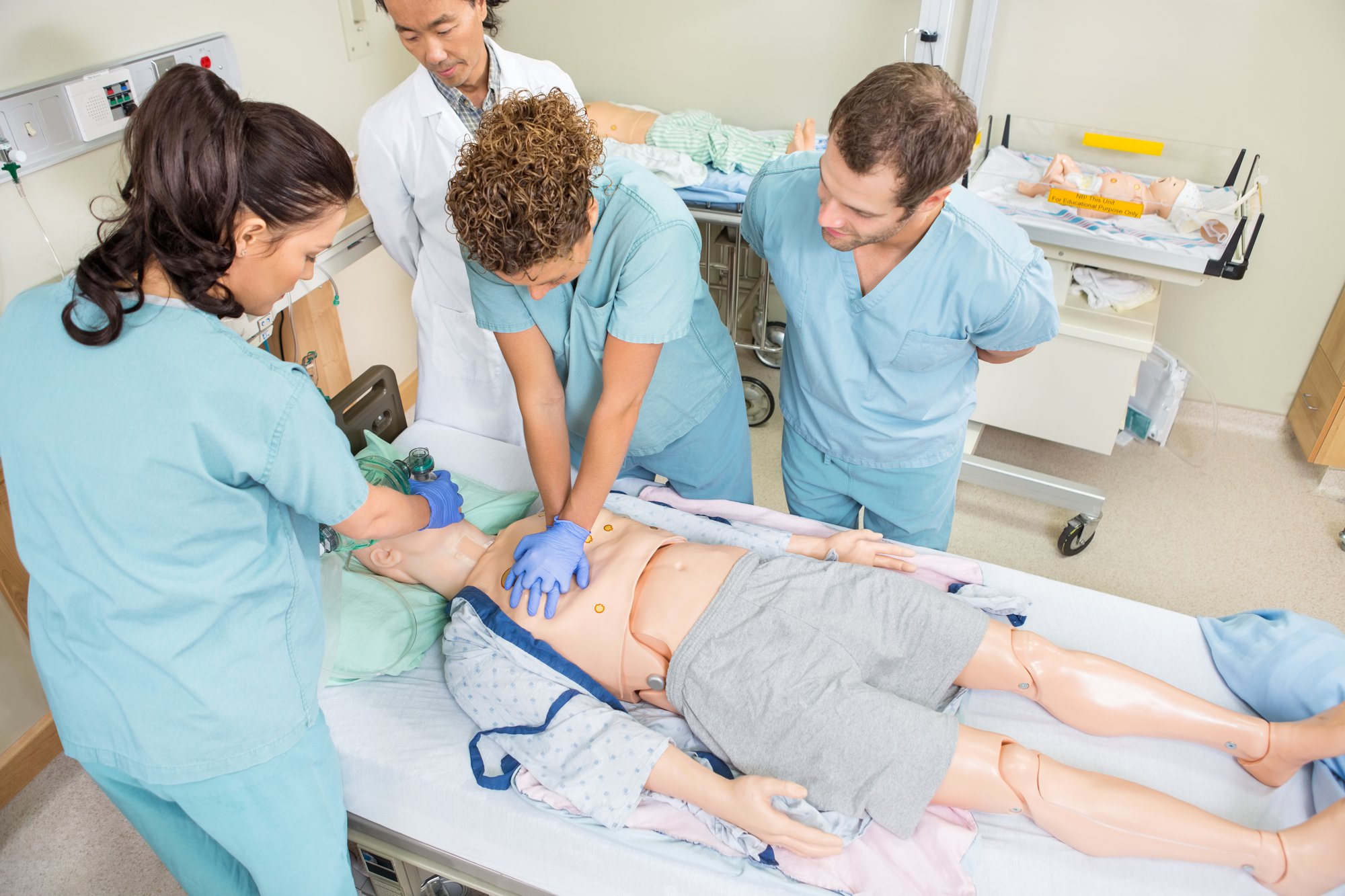How Long Is Nursing School? Timeline Breakdown by Program & How Long to Become a Nurse

Before going into nursing school, one of the most pressing questions you will ask is how long it takes to get a nursing degree and become the type of nurse you envisioned.
If you want to start practicing as soon as possible, you can pursue educational routes that are shorter than the ones required of a registered nurse (RN), including becoming a certified nursing assistant (CNA) or a licensed practical nurse (LPN). If your final goal involves advanced nursing credentials, the recommended academic route will take longer, but the results will match the effort.
You must assess your situation carefully: Are you fresh out of high school? Are you already working and can't afford to quit your job to enroll in a full-time nursing program? To help you answer these questions, we will show you how long nursing school takes, depending on the program you might choose.
How Long Is Nursing School?
To become a registered nurse (RN), you need to spend 2 to 4 years in nursing school, depending on the level of certification you want to achieve before starting your career. Whether you want to complete a 2-year Associate Degree in Nursing (ADN) program or a 4-year Bachelor of Science in Nursing (BSN), you will be eligible to sit the NCLEX-RN exam and become licensed as a registered nurse.
However, other entry avenues into the nursing profession may allow you to shorten the initial time spent in nursing school before licensure. Conversely, if you wish to achieve a higher level of accreditation and practice in roles such as an advanced practice registered nurse (APRN) or a nurse practitioner (NP), you will have to continue your education following the completion of your entry-level degree. The different choices in specialization and your career goals can change the time spent in nursing school.
And, although each degree has a standard completion period, your current educational background can affect how long it takes you to graduate.
How Long to Become a Nurse: Breakdown by Degree and Program
Below, you can explore how long nursing school will take based on your chosen program and desired level of accreditation:
|
Program Type |
Nursing Program Length |
Acquired Nursing Level |
|
Certified Nursing Assistant (CNA) Program |
4-12 weeks |
Certified Nursing Assistant (CNA) |
|
Practical Nursing (PN) Diploma |
12-16 months |
Licensed Practical Nurse (LPN) or Licensed Vocational Nurse (LVN) |
|
Associate Degree in Nursing (ADN) |
2 years |
Registered Nurse (RN) |
|
Associate of Science in Nursing (ASN) |
2 years |
Registered Nurse (RN) |
|
LPN-to-ASN Path |
16 months |
Registered Nurse (RN) |
|
Bachelor of Science in Nursing (BSN) |
3-4 years |
BSN-Level Registered Nurse (RN) |
|
RN-to-BSN Track |
1 year |
BSN-Level Registered Nurse (RN) |
|
Master of Science in Nursing (MSN) |
2-3 years |
Nurse Practitioner (NP) or Advanced Practice Registered Nurse (APRN) |
|
Doctoral Level Programs (DNP or Ph.D. in Nursing) |
1-2 years |
Doctor of Nursing Practice (DNP) or Clinical Researcher |

How Long Does It Take to Earn a Nursing Degree?
Here's how long it takes to become a nurse, as well as what you will study, what exams you will attend, and the outcome you can expect, depending on your chosen educational path.
Certified Nursing Assistant (CNA)
Earning a CNA qualification will take learners anywhere from 4 to 12 weeks, depending on the program chosen.
The certified nursing assistant is an entry-level role that offers a fast way to enter the job market in the healthcare industry. It is also an accessible choice, and a high school diploma or a GED is all that is needed to qualify for the training program. You can enroll in a CNA preparatory program in community colleges, vocational schools, or healthcare facilities.
According to the US Bureau of Labor Statistics, there are over 1.4 million nursing assistants nationwide, with an estimated salary of $41,270 per year or $19.84 per hour, at the national level. There are about 216,200 openings for nursing assistants each year, and 62,400 new jobs are projected to be created by 2033.
Qualification requirements for nursing assistants differ by state, but in general, you only need to complete the program and pass the final assessment. The CNA program curriculum includes both theoretical instruction and clinicals, totaling at least 75 hours of training for qualification. To get your certificate, you must also pass a specific CNA exam.
Licensed Practical Nurse (LPN)
It takes from 1 year to 16 months to become an LPN by completing a practical nursing (PN) program. You can expect classes that include theoretical instruction, classroom work, and clinical practice. You can enroll in a PN diploma program in community colleges, vocational schools, or healthcare facilities, and online hybrid programs are also available. To get the license and become an LPN, you have to pass the NCLEX-PN exam.
Licensed practical nurses provide primary care to patients and complete duties under the supervision of a registered nurse. According to the latest data from the BLS, licensed practical nurses (LPNs) make an average annual salary of $63,540, or $30.55 per hour. According to the most recent workforce statistics, approximately 657,800 licensed practical nurses are working in the US, with 54,000 job openings annually, and a projected increase in the nursing pool of 16,900 by 2033.
Find out more about current LPN salaries across US states and what you can expect based on where you reside.
The PN Diploma Program at Nightingale College is designed to prepare learners for licensure in the most flexible way possible, combining fully online didactic instruction with on-ground supervised field experience. You can complete the accredited curriculum in as few as 12 months or three academic semesters.
Start your nursing career with our PN Diploma Program. Send in your application today!
Associate Degree in Nursing (ADN)
It takes 2 years to get an associate degree in nursing and become a registered nurse. It’s the shortest path to enter the job market as an RN without any experience. You can also pursue an Associate of Science in Nursing (ASN) or an Associate of Applied Science (AASN) degree, which are equivalent in learning time and outcomes but place different degrees of importance on practical skills.
As an ADN student, you will study nursing fundamentals through core classes and gain hands-on clinical experience. You also need to attend general education (GE) courses. Still, if you have previously attended a community college or post-secondary school, you can receive credit for them, which can lead to a shorter learning period. The ADN program prepares you for the NCLEX-RN exam, the national licensure exam you must pass to start working as a registered nurse.
According to the Bureau of Labor Statistics, registered nurses earn an average annual salary of $98,430 or $47.32 per hour. However, salaries differ significantly by state, role, and depending on whether you hold an ADN or a BSN.
Read our updated nurse salary by state study to discover all differences in payment based on location and accreditation.
Granted, many healthcare institutions prefer BSN-trained nurses, but you should not disregard earning your ADN as a great way to start your nursing career. According to the Journal of Nursing Regulation, around 24.3% of medical staff begin their RN career with an ADN or ASN, and there are many reasons why.
It's less expensive and takes less time, so you'll become a nurse faster. You will also gain experience, and when you feel ready to advance your career, you can return to school to earn your BSN in an RN-to-BSN program.
LPN-to-ASN Bridge Program
If you already have our LPN certification, you are eligible for an LPN-to-ADN fast-track program that can be completed in as few as 16 months. The program focuses on clinical practice, capitalizing on the LPN formation and work experience, allowing you to become an RN in approximately 2 years and 4 months.
Read our guide to the LPN to RN path and discover how long it takes to become an RN if you have a PN diploma, as well as other helpful information about the educational program.
The LPN-to-ASN track at Nightingale College is a 16-month hybrid program that combines online instruction with on-site practice to provide an accessible learning experience. Its curriculum is accredited by the National League for Nursing Commission for Nursing Education Accreditation (NLN CNEA), helping LPNs acquire all the skills and knowledge needed to pass the NCLEX-RN exam and receive their RN licensure.
Enroll in the LPN-to-ASN Program and advance your career!
Bachelor’s Degree in Nursing (BSN)
A BSN program takes 3 to 4 years of full-time study in traditional educational formats. This is the most popular educational route for undergraduates, especially if they know from the start that they want to become an RN.
Program attendees get in-depth specialized nursing courses, classes related to critical thinking and decision-making, ethics, and policy, as well as research, technology, and leadership. The BSN curriculum broadens the scope of your practice and grants you more career advancement opportunities, including highly sought-after nursing specialties like informatics nurses, legal nurse consultants, oncologists, or pediatric nurses.
RNs with a BSN can expect to earn higher salaries than nurses with LPN or ADN degrees. A registered nurse with a BSN would qualify to earn wages in the 75th percentile for RNs, with a yearly average of $107,960 or $51.90 per hour, as reported by the BLS.
Starting with a BSN is also becoming the standard for RNs. According to the American Association of Colleges of Nursing, 71.7% of registered nurses in the US have a BSN or a higher degree, with 51.5% entering the workforce with a bachelor's or entry-level master’s degree.
If you want to begin or advance your career in nursing with maximum flexibility, you can start with the 32-month BSN program at Nightingale College. It’s a hybrid program that combines online instructional classes with on-ground and hands-on field training under expert supervision.
Go to the next level in your nursing career with our BSN Program. Send in your application today!
Bachelor’s Degree in Nursing as an ADN RN
If you are already a practicing registered nurse after having completed an ADN program, you can enroll in an RN-to-BSN bridge program. This type of program, designed for working professionals, usually takes up to 2 years to complete, but can be finished in as few as 1 year (or eight months if you have already met all the general education requirements). In this case, taking into account your ADN degree, you could spend a total of 3 to 4 years in nursing school. Most RN-to-BSN programs are entirely online.
This program is also perfect for older nurses who, after years of experience in the nursing workforce, need to return to school to continue practicing. In nursing, you are never too old to extend the scope of your knowledge, especially since this field requires lifelong learning and continuous education. Read more about why going back to nursing school through an RN-to-BSN program is worth it, even for experienced nurses.
While ADN-trained RNs are primarily prepared for the clinical aspect of the job, BSN holders, with additional training in leadership, nursing research, management, and more extensive clinical skills training, are open to more opportunities, specialized roles, and more rewarding benefits.
Discover the differences between ADN and BSN to decide which degree fits your career plans, and read more extensively about how long it takes to get your BSN.
If you are ready to upgrade your nursing credentials with the maximum comfort guaranteed, the RN-to-BSN Track at Nightingale College is the best option for you. The fully online program has been specifically designed for working professionals, with a focus on experiential learning hours dedicated to Community Health and Capstone Projects.
Enroll in our RN-to-BSN Track and advance your career in nursing!
Master of Science in Nursing (MSN)
Getting an MSN, which takes 2 to 3 years to complete. Holding a BSN degree is a prerequisite for enrolling in an MSN program. Thus, reaching the MSN level of certification with no prior experience or preparation can take 6 to 7 years of nursing school.
During the program, you will advance the skills you earned during your BSN studies and gain skills in organizational leadership, interprofessional collaboration, and evidence-based practice.
Read our BSN vs. MSN comparison to decide if you should pursue further education in nursing.
An MSN will prepare you for leadership and administrative positions and highly specialized nursing roles. You will also be eligible for careers in education and research. The three most frequent educational paths when it comes to MSN programs are:
- MSN for Educators (MSN Ed) – Enrolling in the program and becoming a nursing instructor, you will play a vital role in the future of the healthcare system. You will educate aspiring nurses and ensure the standards of patient care are always at the highest level.
- MSN for Family Nurse Practitioners (MSN FNP) – Upon completing the program, you become a family nurse practitioner (FNP) tasked with providing primary healthcare services to individuals and families from diverse backgrounds and age groups.
- MSN for Psychiatric-Mental Health Nurse Practitioners (MSN PMHNP) – You can also specialize in diagnosing and treating patients who experience mental health challenges. As a psychiatric-mental health NP, you will also conduct therapy and prescribe medications to patients with cognitive disorders, medical-organic brain disorders, and substance abuse issues.
Other options include clinical nursing, midwifery, anesthesia, public or community health specializations, administration, informatics, nursing research, and leadership. Around 17.9% of nursing staff personnel hold an MSN, as reported by the Journal of Nursing Regulation.
Although it does take significant investments of time, effort, and money, this degree comes with compelling rewards. According to the Bureau of Labor Statistics, Advanced Practice Registered Nurses (APRNs) earn considerably higher salaries. Psychiatric mental health nurse practitioners (PMHNPs) earn approximately $144,860 per year or $69.64 per hour, followed by nurse practitioners (NPs), who earn $132,000 per year or $63.46 per hour, certified nurse midwives (CNMs), who earn $128,110 per year or $61.59, and nurse educators and instructors (NEs/NIs), who earn $87,090 per year.
Discover more about MSN nurse salaries across the country.
Find out how to get a Master of Science in Nursing and why you should consider it for furthering your career.
Doctoral Programs (DNP or Ph.D.)
A full-time post-master’s doctoral program will take 1 to 2 years of full-time study. Most doctoral programs require a Master of Science in Nursing or a Bachelor of Science in Nursing. Thus, the shortest time to earn a DNP, PhD in Nursing, or a similar degree is 7 to 9 years of learning, not including clinical practice or research experience that may be required for eligibility and enrollment.
There are two primary options for doctoral programs in nursing: the Doctor of Nursing Practice (DNP) and the Doctor of Philosophy in Nursing (Ph.D. in Nursing). Both of these options are terminal degrees, offering the highest level of training in their respective fields. DNP is a practice-based doctorate for registered nurses who want to advance their studies as APRNs, while a Ph.D. is more research-oriented and is aimed at aspiring nurse scientists and scholars. Other alternative, more specialized options exist.
One notable and recent change in certification requirements for nursing professionals is that, as of 2025, certified registered nurse anesthetists (CRNAs) are required to hold a Doctor of Nursing Anesthesia Practice (DNAP) to be approved and start practicing, whereas in the past, CRNAs were MSN-level advanced practice registered nurses.
Read more about the projected salaries of certified registered nurse anesthetists.
How Long Does It Take to Become a Registered Nurse?
Becoming or advancing to an RN can take between 16 months and 4 years, depending on the educational path you choose and your current accreditation.
|
Learning period required to become an RN |
Prior accreditation* |
Desired RN-level degree |
Recommended learning path |
|
3 to 4 years |
None |
BSN |
|
|
2 years |
None |
ADN |
ADN Program |
|
16 months |
PN diploma & NCLEX-PN passed |
ADN |
|
|
2 to 3 years |
PN diploma & NCLEX-PN passed |
BSN |
LPN-to-BSN Path |
|
19 months |
Bachelor’s degree in a different field |
BSN |
ABSN Program |
* Keep in mind that, although entry-level programs require no prior certification, they may have specific prerequisites. Learn more about the nursing prerequisites to take in high school, as well as how to get into nursing school.
Since a BSN degree is preferred by more and more employers in the industry and also qualifies you for better-paid positions, you should consider enrolling in a BSN program. Alternatively, if you already have an ADN, you can earn your BSN faster via bridge programs.
At Nightingale, you can enroll in the BSN Program, a hybrid learning option that combines online concept-based learning, virtual simulations and labs, and supervised on-ground field experiences (SOFEs) to deliver high-quality nursing training and education in the most accessible way. The program will allow you to earn your BSN certification and be ready to take the NCLEX-RN exam in under 3 years of learning.
As a learner, you will also be eligible for support in the form of academic success plans, NCLEX coaching and preparation, career services, and financial aid in the form of scholarships.
Find out more about the learner experience at Nightingale College, including the available resources, learner services, and financial aid options.
If you already hold an ADN and are a certified registered nurse, you can earn your BSN degree via a fully online 12-month RN-to-BSN Track that allows you to advance your education in the most accessible and career-friendly way.
How Long Does Certification Take After Graduation?
All the educational paths above qualify you to sit the NCLEX-RN and earn your registered nurse credentials. Following graduation, you will also receive your Authorization to Test (ATT) and be able to schedule your exam. Most graduates will schedule the exam within 1 to 4 weeks after getting the ATT.
The NCLEX is a one-day computerized exam, and your results will be available within 2 to 10 days after testing, depending on your state, with a maximum waiting period of 6 weeks. If you need to resit the exam, you must wait an additional 45 days before trying again.
Generally, graduates complete their certification period and earn their licensure within 1 to 3 months after graduation. However, the period between finishing a program and being eligible for employment in the nursing profession will vary depending on how quickly you apply, schedule, and pass the exam.

How Long Does It Take to Earn Specialty Certifications?
No matter what level of education you currently have or aim to earn, you can pursue specialty certifications to open new job opportunities and advance your career. The length of certification programs varies, as it involves documenting your work experience to be eligible to sit the examination.
Additionally, you will also need to renew most certifications that you obtain every few years. Validity periods also vary, typically ranging from 2 to 3 years.
For instance, one popular additional certification for LPNs is for IV therapy, which can take up to 6 months to earn and is valid for 3 years. Other options for LPNs will include long-term care, pharmacology, nephrology, urology, or correctional health.
RNs have many other options, including critical care, pediatric nursing, neonatal nursing, oncology, and emergency nursing. For critical care, for example, you will need to prove 2-to-5 years of work experience in the field to apply for the Certified Acute or Critical Care Nursing (CCRN) examination. Once you earn your credentials, you can work in the field for three years, after which you will need to retake the exam to renew your certification.
Whether you enroll to receive a new degree or pursue certification in a field you
are drawn to, you should understand why continuing education is vital for nurses and your career.
How Long Does It Take to Get Clinical Experience?
Many educational institutions will require you to accumulate clinical experience before enrolling in one of their programs. This period is often considered a prerequisite and can lengthen your overall time spent in education. Usually, the recommended minimum time for clinical experience is around 100 to 150 hours. Anything approaching the upper threshold of 300 hours is ideal for most medical schools, while anything below 100 hours is on the lower end of the range.
You will generally attend between 120 and 140 clinical hours per semester. You will need to complete clinicals several days a week, with shifts ranging from 4 to 6 hours to 8 to 12 hours in length.
However, the required number of clinical experience hours depends on the type of activities you have participated in. Shadowing one or more doctors weighs more heavily than volunteer work or a hospital scribe position, for instance. Additionally, if you have taken a considerable gap period in your education or job activity, you may need to accumulate more experience hours than other candidates.
The overall requirement for clinical experience will also depend on the program you pursue, the school you apply to, and where you reside and look for certification. However, most educational institutions will publish their requirements or disclose them to interested learners.

Can Working While Learning Affect Your Graduation Timeline?
Both work and school are significant commitments, but proper time management, careful scheduling, and choosing the right school will make it possible for you to enroll in a program that will help advance your career while working. Not everyone has the luxury of taking some years off for school with no stable source of income, so explore some essential tips for working while in nursing school.
Many life events can also interfere with your education. Read our guides on going to nursing school while pregnant or how to tackle being a parent and a nursing student.
However, your other commitments may limit your ability to attend a full-time program, delay your graduation, or increase the stress you experience, putting you at risk of burnout. Beyond preparing a dependable schedule and organizing your study and work to a T, you should also consider less intensive and more accessible programs. Although it may take you longer to graduate, you will not run the risk of abandoning your education or failing your exams.
At Nightingale College, we know that completing the learning process as quickly as possible is a key criterion for choosing a program and a significant advantage for aspiring nurses.
That is why our academic programs combine online instruction, virtual simulations and labs, in-person seminars, and supervised on-ground field experiences in accessible settings to deliver certified, high-quality education in the shortest and most accessible time possible. Our curriculum focuses on concept-based theory, skill-based intervention, case-based preparation, and direct, focused client care preparation. Full-time programs culminate in a leadership-oriented Capstone Project that allows learners to apply the skills and knowledge they have gained while still in school.
Since most learning paths require learners to complete practical experiences, we partnered with various healthcare organizations nationwide to provide our learners with the opportunity to complete the necessary supervised field experiences, regardless of their location. You can find the Supervised On-Ground Field Experience (SOFE) Areas here, along with their eligibility for various learning programs.
Additionally, we offer additional support to our learners via learner resources such as library access and support, live tutoring, human development resources, and webinars, learner services including but not limited to counseling, individual NCLEX coaching, career tutoring and events, academic success plans, as well as and housing, commuter, and childcare services, and financial aid in the form tuition estimations, financial plans adapted for each program, and scholarships.
Read more about the learner experience at Nightingale College. You can also find more information regarding tuition and aid.
No matter where you find yourself professionally, academically, and personally at the moment, we are here to help you achieve your desired career in nursing. Our mission is to empower aspiring learners from all walks of life, including those from historically underserved and underrepresented communities, to reach their full potential and achieve excellence in the field of nursing.

Frequently Asked Questions
How Many Years Is Nursing School?
While the length of your time spent in nursing school will depend on your program of choice and career objectives, most learners will attend nursing school for 2 to 4 years to become registered nurses.
However, RN certification is not the only way to start your nursing career. Various roles, such as licensed practical nurses or certified nursing assistants, require students to spend less time in nursing school.
You should also remember that continuing education and going back to school are two cornerstones of career advancement in the nursing profession. You will eventually spend more than 2 to 4 years in nursing school, particularly if you want to access specific advanced practice roles.
How Long Does It Take to Get an LPN License?
To obtain PN licensure, you must complete a program that takes between 1 year and 16 months. Once you have graduated from the PN Diploma Program, you must attend and pass the NCLEX-PN. If you fail the exam, you must wait 45 days to retake it.
How Long Does It Take to Become a Nurse?
You can become a nurse in 2 to 4 years, followed by an additional 1 to 3 months for NCLEX certification.
Once you have completed your specific educational program, you will receive your Authorization to Test (ATT) and can schedule your exam. Generally, graduates schedule their exams 1 to 4 weeks after receiving their authorization to test. The NCLEX is a one-day exam, and you will receive your results in 2 to 10 days.
However, the overall time it takes to become a nurse will depend on multiple factors, including your desired career, the length of the nursing program, whether you have completed all prerequisites, and the time it takes to attend and pass the certification exam.
How Long Does It Take to Become a Registered Nurse After High School?
If you aim to become a registered nurse with no previous experience or accreditation, you can either pursue an ADN or ASN program that takes 2 years or a BSN degree program that takes 3 to 4 years. While associate degrees are the fastest route to becoming a registered nurse, many states and employers will require you to earn a Bachelor of Science in Nursing at some point in your career, which you can do through RN-to-BSN bridge programs (with a length of 1 year).
What Is the Fastest Way to Become a Registered Nurse (RN)?
The fastest way to become a registered nurse depends on your starting point and previous accreditation in the field. If you are starting from zero, you can pursue a 2-year ADN program and pass the NCLEX-RN to become a registered nurse. However, if you are already a licensed practical nurse, you can complete an LPN-to-ASN program within as few as 16 months, take the exam, and become a registered nurse.
How Long to Become a Nurse Practitioner (NP)?
Nurse practitioners need to earn a master's degree in nursing (MSN), which generally takes 2 years to complete. However, MSN programs require applicants to hold a bachelor’s degree in nursing, which would add 3 to 4 years of education. So, if you are starting from scratch, you can expect to be in school for 5 to 6 years in total before receiving an MSN degree and becoming a nurse practitioner.
What Is the Most Common Degree in the Nursing Industry?
According to the American Association of Colleges of Nursing, the broad majority (71.7%) of the RN workforce holds a BSN or higher degree, with over half (51.5%) of new job applicants having a bachelor’s degree in nursing or higher.


